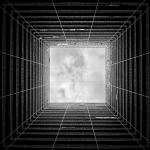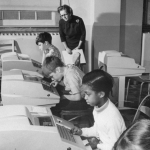2011
David Shields is hungry, but not hungry enough. So says Curtis White, who argues that by ignoring anti-realism's past and present, Shields writes as if "New York" and "now" are the only contexts that matter.
In his introduction to the Cognitive Fictions cluster, Joseph Tabbi suggests that reflexive, non-narrative literature plays a critical role in the new media ecology. Postmodernist writing by Joseph McElroy and Italo Calvino, the posthumanist thought of Cary Wolfe, and the emerging forms of electronic literature each occupy a position between narrative modes of consciousness and "object-oriented" computer and cognitive science.
2010
Stephen Burn connects Don DeLillo's fifteenth novel, Point Omega, with the author's long-running investigation into the structures of the mind. Using an elusive narrative architecture, images from a slowed-down film, and moments of second- and third-order observation, the novel dramatizes the mind's pre-conscious fiction-making processes.
D. Fox Harrell considers how a media theory of the "phantasmal" - mental image and ideological construction - can be used to cover gaps within electronic literary practice and criticism. His perspective is shaped by cognitive semantics and the approach to meaning-making known as "conceptual blending theory."
In this review-essay, James J. Pulizzi reads Joseph McElroy's 1977 novel, Plus, as a Bildungsroman for the posthuman: instead of tracing the development of a subject, the novel traces the development of processes that call the very idea of a subject into question. As a human brain adjusts to its new housing in an experimental satellite, the text unfolds in a series of re-entries and re-mappings, an unfolding that necessarily implicates the reader.
Minds bind - make coherent meaning from distributed processes - and narratives do, too. The means by which they do so remains a mystery, however. Kiki Benzon suggests that this mystery is at the heart of Mark Z. Danielewski's House of Leaves, a text whose layered structure, typographical blending, and central metaphor - a house much bigger than the sum of its parts - enact the problem of binding on multiple levels.
Excerpted from a forthcoming nonfiction book on water, Joseph McElroy's essay ponders (among other questions) the relationship between the physical waters of the world and brain and the phenomenal waters of the mind. "I meant to ask, 'What has water to say on the subject of us?" - i.e., on its own without prompting? Dumb question, it tells me."
In his new book, Michael Wutz examines how the work of four canonical novelists - Norris, Lowry, Doctorow, and Powers - register the revolutions in 20th century media technology. Such an analysis, reviewer Joseph Conte suggests, is an important extension of Kittlerian media theory to the field of American literature.
Eric Dean Rasmussen explores Lynne Tillman's "cognitive aesthetic," suggesting that her work is powered by the generative disconnect between asignifying affect and signifying emotion. He argues that her 1998 novel, No Lease on Life, examines the role of affectively sustained universal values in responding politically to the neoliberal city.
John Bruni suggests that Cary Wolfe's new essay collection explores the various cognitive fictions of humanism and carves out a functional role for systems-influenced theory and art.
David Haeselin reviews Ted Striphas' The Late Age of Print, which explores the crucial role of book publishing in today's society of controlled consumption. The oft-repeated death knell for reading, Striphas argues, is the equivalent to a Fox News jeremiad on the death of American morality: it's wholly ideological and selective.
In this review of Cary Wolfe's new essay collection, What is Posthumanism?, Neil Badmington reflects on the ebb and flow of "the posthuman" and ponders what Wolfe's work suggests for the future of the field.
Mark C. Marino explains the rationale for the Critical Code Studies Working Group, a six-week experiment in using social media for collaborative academic production. Marino also analyzes the first week's discussion, which focused on debates about what it means to read "code as text."
What does it mean to apply a "critical" lens to programming code? Members of the CCS Working Group grapple with this and other foundational questions, hashing out the methods, boundaries, and stakes of a new academic field. This essay is part of a series on Critical Code Studies distilled from a six week online discussion.
Timothy Morton offers a critical reading of Roderick Coover's video Canyonlands: Edward Abbey and the Defense of Wilderness. In the video's stark modernist form, Morton writes, "the hydroelectric engine of human progress still hums." What's needed now, he suggests, is a "Goth remix."
Daniel Worden's riposte to Sean O'Sullivan's piece on Deadwood argues that O'Sullivan's "formalist account does not acknowledge... Deadwood's connection to a kind of historical necessity that governs not just the show's characters but also the very structure of the show as a historical drama about the West on late twentieth-century cable."
Sean O'Sullivan explores numerous aspects of narrative and seriality in his examination of the HBO series Deadwood, created by David Milch. O'Sullivan argues that Deadwood often resists seriality's dictates and conventions by adhering to, amongst other structures, Aristotlelian dramatic principles that are by nature at odds with seriality's essence. This is but one example of the existence of an "internal constriction" that "pushes against some of the conventions of television serials by denying...
In this piece - part introduction, part artist's statement - Whitney Anne Trettien reflects on her "combinatory" approach to the history of "text-generating mechanisms."
Christopher Douglas argues that within the fictional world of the popular online game World of Warcraft, race is not understood as being socially constructed, but rather as a biological fact, "composed of inherited, immutable, essential differences," and thus perpetuates the old-fashioned "notion that the outward packaging signifies an inner reality, where the differences are."
David Golumbia's response to Brian Lennon's "Gaming the System."




